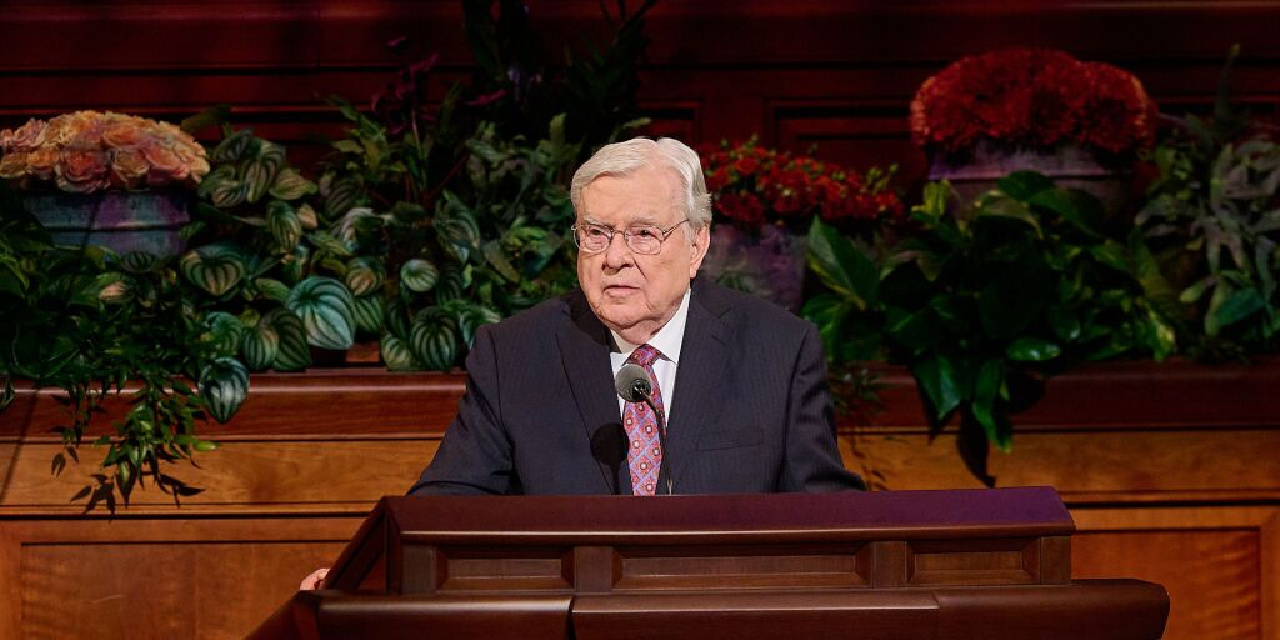In The Church of Jesus Christ of Latter-day Saints, we believe that through the grace of our Lord, we can return to heaven—a heaven that’s as bright as the sun. There, we can inherit all the lovely things our Heavenly Father has to offer. Some find it difficult to imagine themselves abiding such celestial grandeur, however, and there’s a new breed of social media influence openly sermonizing the benefits of reaching for the stars, maybe the moon—basically aspiring for the terrestrial.
These messages seem especially aimed at Latter-day Saint women as a solution for mental health distress; “make your own choices,” “Do what’s best for you,” “God doesn’t want you to worry about details,” “The gospel of Jesus Christ is a menu of religious options to pick and choose from, just take what works for you.”
There’s a tone to these sentiments that resonates with a tired, unsure heart. And there are certainly elements of truth that this is ultimately “our choice,” and ought to take care not to allow anyone to make the choice for us. The Celestial kingdom is something worth striving for.
Finding Comfort in the Celestial
In the early days of the Restoration, many saints brought from their Protestant upbringings hellfire and brimstone views of an impenetrable, tiny heaven and a cavernous hell enough to fit us all. However, Joseph Smith’s teachings turned that idea upside down. As received in a vision, the prophet taught that not only is heaven immense, its vast territory is so enormous it includes three glorious kingdoms.
When Joseph Smith shared more details about what heaven is really like, it was a bit much for some folks to handle. So inclusive it was! Some even decided to leave the Church over it.
Times certainly change. These days, as the Church focuses on the covenant path to the Celestial kingdom, many insist this doctrine is more on the exclusive side. Surely the Celestial Kingdom should have room for those …
- Who feel different
- Who are angry at the Church’s stance on (fill in the blank)
- Who doubt some of the core gospel truths, but still like the Church
- Who relish ambiguity and paradox, while scoffing at the simple clarity of gospel witness
- Who find gospel living too exhausting to be healthy emotionally
- Who see repentance as inherently shaming
- Who have realized their addiction reflects a part of themselves, rather than something to overcome
- Who simply aren’t interested in covenant marriage now, or pursuing the desire in the future
- Who are annoyed by the idea of ever nurturing children (or at least making it a top priority)
Concluding that the highest heaven is overly exclusive can reinforce a stubborn persistence to follow your own path, make your own rules, and expect the Church (and God?) to adjust. Either that or simply decide that the Terrestrial Kingdom will be a far more welcoming and comfortable place.
This is what happened to each of us authors, albeit for entirely different reasons:
“Science was our religion at home.” Gale grew up not too far from Hollywood with an extended family comprised of intellectually aggressive Jewish Democrats with whom she felt very comfortable. When she joined The Church of Jesus Christ of Latter-day Saints at sixteen years old, this built-in culture from her family of origin didn’t change quickly. Through her 20s, she considered herself more of a “terrestrial-type” person. “I was good, but I was earthy, and I knew it.” She felt different from what she perceived as the somewhat bland Latter-day Saints she knew at church and often felt on the periphery, convinced she would likely never feel comfortable in the main body of believers. She worried, “If I wasn’t comfortable there, would I be comfortable in heaven?”
“Rules were our religion at home.” Carol was raised in the Church since birth by convert parents who steadfastly gripped the rod in fidelity to prophets and apostles. Her upbringing was drenched in teachings that strict obedience and the letter of the law would keep one safe. “We happily discarded even Coca-Cola flavored candies from our Bottle Caps packages.” White knuckle obedience sometimes left her exhausted, and in her teens, she had abandoned hope that she would ever be good at keeping the rules. “The mistakes piled up, tripped me up, and I considered celestial aspirations far outside my reach.”
Attitudes that Foster Terrestrial Thinking
Marinated in Babylon, we can find ourselves, like the prodigal son, wearily wading in pig slop and dreaming about the least of what the Father has. In such a spot, the servant’s quarters would be more than enough. After all, stars glitter, and even a sliver of the moon cuts light through a darkened night sky. As mortal challenges loom large, they can leave us unwittingly aspiring for the terrestrial.
We and others we love have felt some of this and the other following illustrations:
Struggling with differences in relation to other believers. For some, it can feel like congregations of Saints are homogenous and a mold too difficult to fit into. Gale remembers a time when her Relief Society president admitted to praying every Sunday that someone would sit next to her since it appeared other women were intimidated by her. What the president didn’t realize was that Gale was fine because she was there for the gospel and made an effort to pull inspiration from each lesson. She was used to making only a few friends in each ward she lived in and had decided to faithfully attend anyway. When we find ourselves with an empty seat next to us, fill it with hope or slide over. Or be like Gale and attend even when the chairs next to you stay empty.
Feeling overwhelmed by crosses. We have the scripture, “And he that will not take up his cross and follow me, and keep my commandments, the same shall not be saved.” Christ’s early apostles fulfilled this injunction, and they were all martyred. Not an encouraging thought, right? Especially when many of us (and our loved ones) have crosses today that can feel impossible to bear. Can we say it’s not fair and that the standards need to change? Surely, we could … until we get a glimpse of the reward for carrying those crosses and come to understand He doesn’t expect us to carry them without His help.
Hindered by perfectionism. Latter-day Saints have been accused of following a “works-based gospel” and not a “grace-based gospel.” There may be some truth to this, but not because of our doctrines. It was perfectionism that stalled Carol’s progress in her youth—a mental checklist that defined a “good Latter-day Saint” without a mature understanding of why. A works-based list, absent of Christ’s saving grace, kills joy. When Christ said to His Jewish audience in His sermon on the mount, “Be ye therefore perfect, even as your Father which is in heaven is perfect,” He didn’t elaborate because there was no need. The word “perfect” in Hebrew and Aramaic means “whole” or “complete.” The Jews already knew that to be “complete” was a divinely-involved process leading to manifesting the seven attributes of God, which are …
- Love (the highest kind of love)
- Justice
- Mercy
- Prophecy
- Priesthood
- Kingship
- Enduring to the end in faith
To judge our progress according to this list is to ask ourselves, “Am I loving,” “Am I merciful,” “Am I just.” It’s an easier list, actually. The temple and the covenant path are found in this list. This is the way—His way—and it is perfect.
Hindered even more by perfectionism. It’s not an accident that this is listed twice. Most of us have another list that we judge ourselves by—the world’s list. It includes how we need to look, what we need to say, how we need to dress, and what we need to achieve by the world’s standards. If we try to fulfill both our church list and the world’s list, we can count on some serious stress. Burnout is real. Sometimes Gale looks longingly at photos of early Latter-day Saint women in their long dresses because nowadays, many women feel pressured to look good in a tiny swimsuit. After bearing 6 kids (which looks great on her church list), Gale harmed her health following radical diets to try to satisfy a norm on her worldly list. The pursuit of worldly perfection leads to twisting in anxious circles while turning aside the Lord’s loving way which is line upon line. The Celestial Kingdom isn’t just for prophets and babies.
Stifled by self-deprecation. Progress stops when self-deprecation parades as humility. True humility “is to recognize gratefully our dependence on the Lord—to understand that we have a constant need for His support.” Cowering to a critical voice ignores the promise of our Savior that He can make weak things strong. We insult more than ourselves when we deny Him that opportunity.
Misled by magical thinking. Elder Todd Christofferson, an apostle in The Church of Jesus Christ, warns that “we ought not to think of God’s plan as a cosmic vending machine where we (1) select a desired blessing, (2) insert the required sum of good works, and (3) the order is promptly delivered.” Fundamentally misunderstanding how God works is also likely to corrode our faith. While God does reward obedience, often in ways that we never expected, that doesn’t mean we won’t have trials. No magic is needed to shift our relationship with obedience from a focus on behavior to one more conscious of our sincere desires; when we get that right, obedient behavior more naturally follows.
To be clear, recognizing ourselves in any of these places doesn’t fate us to reside there. But each of these places can, over time, make us susceptible to stop trying and live below what God wants for us and what we have the potential to become.
Seeing Our Potential through New Eyes
Like the prodigal’s loving father, our Father has more for us than a cot in the servant’s quarters. He sees our worth even when we don’t. “How oft … but ye would not.” What can orient us to Celestial aspirations? And toward an audacity of hope in our divine potential? Perhaps this description, Joseph Smith’s poetic adaptation of his vision, is a place to start:
These are they that have come to the heavenly place;
To the numberless courses of angels above:
To the city of God; e’en the holiest of all,
And the home of the blessed, the fountain of love:
These are they that are perfect through Jesus’ own blood,
Whose bodies celestial are mention’d by Paul,
Where the sun is the typical glory thereof,
And God, and his Christ, are the true judge of all.
This stirring description of Celestial glory includes “numberless” angels—anything but a tiny unobtainable heaven.
Some who read this poem will feel their hearts swell with hope, while others will approach even this visualization of the Celestial Kingdom as inaccessible. Some will look over this list of eternally burdensome attitudes and find some hints for changing their outlook. Others will say any change is useless because the Church isn’t worth changing for.
While the Church is admittedly filled with imperfect people, they have also been entrusted with the authority to seal us for heaven as we progress along the covenant path. That covenant path has to be viewed as a personal and tailored one, even within the established structure we’ve been taught and given. Progress on this journey is catalyzed by a decision to put everything upon the altar (withholding nothing) and let God “prevail in our lives.” Make no mistake: that will forever be worth it. The Celestial Kingdom isn’t just for prophets and babies. It’s for anyone who wants it enough.

















